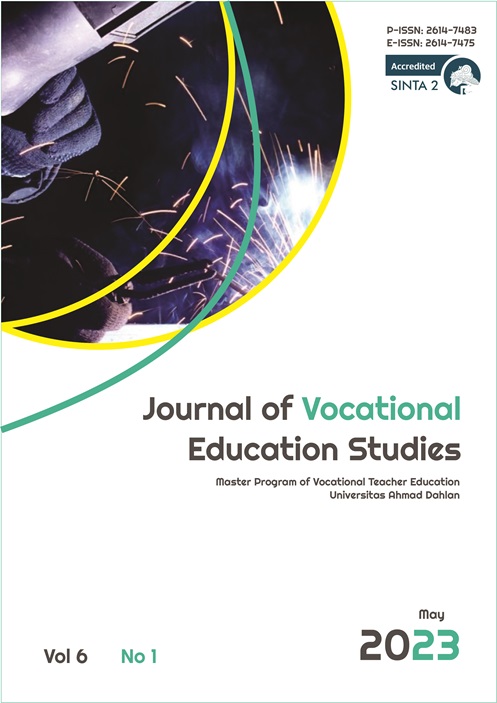Teaching Factory Implementation to Grow the Entrepreneurship Character of Vocational School Students
DOI:
https://doi.org/10.12928/joves.v6i1.8094Keywords:
Teaching factory , Entrepreneurial character of students , Vocational schoolsAbstract
The purposes of this study are 1. To analyze the application of teaching factory (TEFA) in the mechanical engineering expertise program at SMK M Sukoharjo, 2. To analyze the reinforcing and inhibiting factors for the application of TEFA in the mechanical engineering expertise program at SMK M Sukoharjo, 3. To analyze the application of TEFA in growing entrepreneurial character of students in the mechanical engineering expertise program at SMK M Sukoharjo. The research method is qualitative descriptive research. The data collection technique used three techniques, namely structured interviews, field observations and data documentation. The informants were school principals, deputy heads of school curriculum, heads of mechanical engineering study programs, productive teachers, and students. Data validity using source triangulation by comparing different sources. Data analysis techniques using interactive data analysis which includes data collection, data reduction, data presentation, data verification, and drawing conclusions. The results of the study found were 1. Application of Teaching Factory (TEFA) in the mechanical engineering expertise program at SMK M Sukoharjo seen from the application of management functions which include planning that has been made well, the organization has been made into an organizational structure that involves all elements in the school, the implementation is in accordance with implementation standards in the industry, supervision is carried out in stages. 2. The reinforcing factors for the success of TEFA are; a. Adequate infrastructure both in terms of quantity and quality b. Qualified human resources, c. Quality products d. How to work in accordance with industry standards e. Extensive marketing mix. The inhibiting factor is a. Student motivation is still low, b. Low student morale, 3. The application of TEFA can foster the entrepreneurial character of students by involving students in TEFA activities.
References
A.Michael Huberman, dan Matthew B. Miles. (2014). Analisis Data Kualitatif Teori. Tjejep Rohidi. Jakarta: UI Press.
Casmudi. (2022). Pelaksanaan Teaching Factory SMK Center of Exelence Studi Kasus Aspek Pembelajaran Program Keahlian Tata Busana di SMK N 4 Balikpapan. Jurnal Lembaga Riset dan Krutik Interbasional Budapest Vo. 5 No. 2.
Danim. (2002). Menjadi Peneliti Kualitatif. Bandung: Pustaka Setia.
Efendi, Y. & Sudarwanto (2018) Penguatan Karakter Mandiri, Disiplin, Kerjasama dan Kreatif (“Marikerja Kreatif”) Melalui Lesson Study Pada Pembelajaran Teknologi Sepeda Motor: Jurnal Pendidikan Vokasi Otomotif. 1(1), 89-99 dari Doi: https://doi.org/10.21831/jpvo.v1i1.21786.
Hartanto, S., Ratnasari, SL, & Arifin, Z. (2019). Faktor Keterampilan Kerja Siswa SMK Teknik Mesin. Konferensi Internasional Pertama tentang Pendidikan, Sains, dan Pelatihan: Pemberdayaan Sumber Daya Manusia Pendidikan untuk Daya Saing Global, 1–11. https://doi.org/10.18502/kss.v3i15.4349.
Hasbullah. (2016). Implementasi Teaching Factory untuk Meningkatkan Kompetensi Siswa SMK. Seminar Internasional Peran LPTK Dalam Pengembangan Pendidikan Vokasi di Indonesia APTEKINDO hal 385-402.
Ibnu Siswanto, (2011). Pelaksanaan Teaching Factory Untuk Meningkatkan Kompetensi Dan Jiwa Kewirausahaan Siswa Sekolah Menengah Kejuruan. Seminar Nasional 2011 “Wonderful Indonesia” PTBB FT UNY, 3 Desember 2011: 396-404.
Ismail, ME dkk. (2018). Pengaruh Perangkat Ajar Augmented Reality terhadap Visualisasi, Beban Kognitif, dan Gaya Mengajar: Jurnal Pendidikan Teknologi dan Kejuruan. 24 (2), 178-184, dari doi: https://doi.org/10.21831/jptk.v24i2.20031.
Kuat, T. (2015). Penumbuhan Jiwa Kewirausahaan Melalui Praktik Bisnis di Business Center (Studi Kasus: SMK Muhammadiyah 2 Surakarta). Jurnal Pendidikan Ilmu Sosial. 25(1): 115-125.
Kuat, T. (2017). Penumbukan Jiwa Kewirausahaan melalui Implementasi Edupreneurship di Sekolah Menengah Kejuruan. Proceding Seminar Nasional Pendidikan II 2017 (Pendidikan Akuntansi FKIP UMS).
Muhitasari, R. Dan Purnami, A. (2022). Pembelajaran Teaching Factory dalam Mewujudkan Jiwa Kewirausahaan pada Siswa. Media Manajemen Pendidikan Vo. 4 No. 2 hal. 194-202.
Putra W. (2021). Pelaksanaan Teaching Factory pada Bidang Pemesinan ditinjau Sarana Prasarana, Sumber Daya Manusia dan Dukungan Industri (Studi Kasus di SMK PGRI 3 Malang). Jurnal Teknik Mesin Dan Pembelajaran, Volume 4, Nomor 1, Juni 2021, Halaman: 20– 28.
Putra M. dan Suyanto W (2021) Implementasi Teaching Factory Kompetensi Keahlian Teknik Dan Bisnis Sepeda Motor Di Smk Ma'arif 1 Wates. Jurnal Pendidikan Vokasi Teknik Otomotif Volume 4, Nomor 1 November 2021.
Suryana. (2006). Kewirausahaan Pedoman Penelitian: Kiat dan Proses Menuju Kewirausahaan dan Kewirausahaan. Jakarta: Prenada Media.
Sanatang (2020) Implementasi Teaching Factory Pada Program Keahlian Teknik Komputer Dan Jaringan SMK Negeri 5 Makassar Sulawesi Selatan. Jurnal Media TIK: Jurnal Media Pendidikan Teknik Informatika dan Komputer Vol.3 No.3 (September 2020).
Sudiyanto. (2017). Teaching Factory di SMK ST Mikael Surakarta, Jurnal Taman Vokasi. Hal. 9-19.
Sari, A.K. (2022). Manajemen Pembelajaran Teaching Factory dalam Meningkatkan Kompetensi Keahlian Siswa Jurusan Tata Kecantikan di Sekolah Menengah Kejuruan. JRTI (Jurnal Riset Tindakan Indonesia) Vol. 7, No. 2, 2022, pp. 148-155 DOI: https://doi.org/10.29210/30031696000
Torun, H. (2017). Apakah Lulusan SMK Memiliki Hasil Kerja Yang Lebih Baik Dari Lulusan SMA Umum? Bonn, Jerman.
Yunanto, D. (2017). Implementasi Teaching Factory di SMK N 2 Gedangan Gunung Kidul. Jurnal Vidya Karya Vol.3 No.1 (April 2016)
Downloads
Published
Issue
Section
License
Copyright (c) 2023 Universitas Ahmad Dahlan

This work is licensed under a Creative Commons Attribution-ShareAlike 4.0 International License.
Authors who publish with Journal of Vocational Education Studies (JOVES) agree to the following terms: Authors retain the copyright and grant the Universitas Ahmad Dahlan right of first publication with the work simultaneously licensed under a Creative Commons Attribution License (CC BY-SA 4.0) that allows others to share (copy and redistribute the material in any medium or format) and adapt (remix, transform, and build upon the material) the work for any purpose, even commercially with an acknowledgement of the work's authorship and initial publication in Universitas Ahmad Dahlan. Authors are able to enter into separate, additional contractual arrangements for the non-exclusive distribution of the journal's published version of the work (e.g., post it to an institutional repository or publish it in a book), with an acknowledgement of its initial publication in Universitas Ahmad Dahlan. Authors are permitted and encouraged to post their work online (e.g., in institutional repositories or on their website) prior to and during the submission process, as it can lead to productive exchanges, as well as earlier and greater citation of published work (See The Effect of Open Access).










.png)



